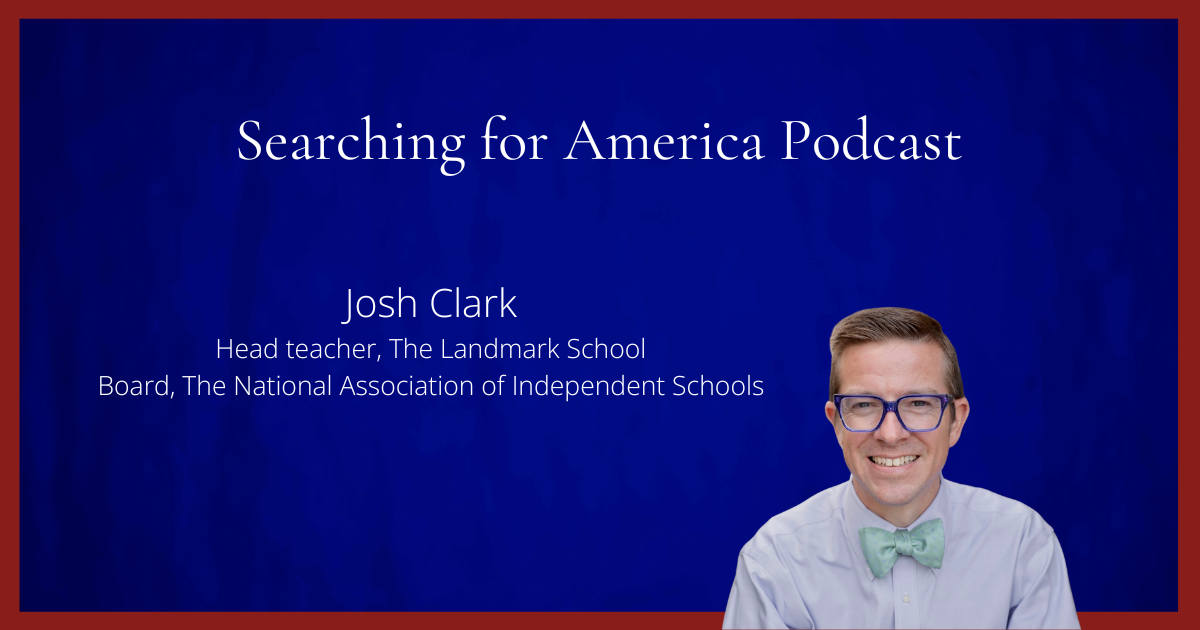Unsafe in schools - from other people’s ideas
Thinking critically and being open-minded to other people’s ideas or opinions has been vilified by the left and right. Both sides advocate banning books - the left wants to ‘protect’ kids from uncomfortable language in novels like Huckleberry Finn or Gone with the Wind and the right wants to ban books to ‘protect’ kids from uncomfortable identity topics such as My Two Mommies.
Josh Clark is the head teacher of the Landmark School in Massachusetts and on the board of the National Association of Independent Schools. He’s also a world expert on teaching dyslexic kids (I met him when he was the head of the Schenck School in Atlanta, where my youngest daughter went, and where I’m on the board.) Josh wears many hats in American education and, critically, he has a broad overview of the challenges facing schools in the USA.
There's a trend to oversimplify complicated issues which has robbed many children of an ability to see history or society as something wonderfully complex and nuanced. The gray areas are a no-man’s land and binary thinking is dominating. Political rhetoric about ‘the other’ creates a false choice between us and them, victim or victimiser, oppressed or oppressor. Nothing is that simple. Josh agrees, “ We have lost all tolerance for complexity.” he says, “We’ve somehow misconstrued ambiguity with a threat.” When ambiguity is lost, so is empathy.
Back to School Battle over ideas
Josh Clark (Part 1)
We need to immerse kids in more ambiguity, says headteacher Josh Clark, who is also on the board of the National Association of Independent Schools. How do the divisions in America manifest in schools?
Is pressure to say the right thing and give the 'correct answer' stifling debate and critical thinking in classrooms? Why have kids lost the ability to put themselves in another person's shoes? Does simplification of complicated issues create less empathy?
Josh Clark's dad was a prison warder which meant Josh grew up in the warder's house inside a prison complex in Hopewell, Virginia.
Growing up in the dynamic of the federal prison system gave Josh a perspective that informs his views on right, wrong, legal, illegal and the need to understand ambiguities and embrace complexity.
Dazed and Confused, U.S.A
Josh Clark (Part 2)
Josh Clark would love to time travel to the 1850's just before the Civil War when the country was dealing with what it meant to be an American. As a Southerner, who grew up Mississippi, he is intrigued by a country that was grappling with itself and at the same time embracing transcendentalism. He lists his favorite books from the pre-Civil War days, written during an time of national tension. Leaves of Grass, Moby Dick and the Scarlet Letter.
Where would you go if you could time travel in american history & other bonus questions
Three words to describe America?
Aspirational
Complex
Participatory
If you could time travel, which era in American history would you like to visit?
1850's because it was an awakening / culmination of uniquely American intellectualism and art. This time period saw the most important publications of some its most important thinkers: Melville, Thoreau, Emerson. Whitman, Hawthorne - much of it in response to the policies, ideas, and laws that would lead to the civil war.
A close second would to be an American expat in 1920's western Europe.
Where did you grow up?
Tennessee
Is there a piece of American art or music that sums up your America?
Campbell Soup Can's by Andy Wharhol
Jean-Michel Basquiat
Which books or movies explain America?
Dazed and Confused
The Simpsons
When did your family arrive in the USA? Where are they from originally?
My maternal great grandparents came from Sweden I believe in the 1930's . My paternal grandparents are of English and Irish descent though I do not know much about their story.
When was the last time you cried?
Recently and often
What's your motto?
Make it New by Ezra Pound. I had it tattooed on my back when I was at college before I new that he was a Nazi sympathizer.
Why is America so divided?
So many reasons. As we abandon or reform longstanding religious and civic institutions, most of which I agree with, it leaves a vacuum of community and reassurance. With fewer institutional opportunities to reflect, affirm and push our values and understanding of the world, we feel threatened and revert to defining ourselves more by what we do not believe than what we do. As life has become more complex, our ability to process it has become less sophisticated and our consciousness much higher.
What issues are driving you to vote? Or not?
I will vote and will vote more against a candidate than for one.
An American president you admire?
Lincoln
An American president you don't admire?
Trump
Sports team?
Tennessee College Footballl
What were your parents' careers? How did they influence your career?
My mom was initially a stay-at-home mom and my dad was a federal prison warden.
I think my dad's job influences how I understand life and my career more than my actual role or responsibility.
I think my experience in school was the most influential by limiting what I saw as possible for myself.
What can be done to bring Americans together?
Dialogue and integration
Favorite American meal or restaurant?
Hamburger and fries
Biggest misconception the rest of the world has about Americans?
Education
Main issues driving your vote?
Vision for the Future
Best advice from a parent or grandparent?
You can always control how hard you work and how you respond.
What does it mean to be an American in 2024?
Privileged and pressured.
Who do you think will win in November?
Trump
